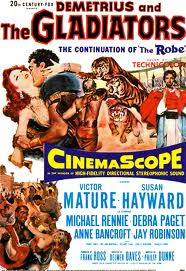In "Demetrius and the Gladiators," released in 1954, which Twentieth Century-Fox has made in Cinema Scope and color as a sequel to its film version of "The Robe," Bosley Crowther said in his review, "the
boys out on Pico Boulevard have cast off the wraps, as it were, and got
right down to the business of making a good old-fashioned Roman circus
film."
The
conflict of Christian faith versus pagan ruling, which was really the
issue for discussion in most of the two hours of "The Robe," as Crowther
states, "underlies
the dramatic action in this sequel at the Roxy, to be sure, but the
conflict between the two forces is expressed in more direct and muscular
terms."
Now
the focus of Demetrius, "The Robe's" freed Christian slave, who – along
with Caligula and Peter – is the only recurring character in this film,
is, as Crowther said, "not
of such paralyzing gravity that it keeps him from wading in, when
occasion demands, and knocking tigers and gladiators all over the place.
Nor
is his spirituality so unswerving that he doesn't backslide just a bit
when the young wife of Claudius vamps him and hauls him off to a villa
by the sea."
In
all honesty, you have to credit Producer Frank Ross and Philip Dunne,
the writer who made this film out of everything instead of "The Robe."
It looks like they understood that religion may make people go to
church, but it has to be more besides the action to get them in the
seats.
Crowther said, "And so they have millinered
this saga along straight Cecil B. Devotional lines, which means
stitching on equal cuttings of spectacle, action, sex and reverence."
They have got Demetrius, reprised by Victor Mature, as a prisoner of the
Romans and a selectee at the gladiator school. Crowther described, "This
place, which has a strong resemblance to the training camp of the
Chicago Bears, is presided over (of all people!) by the fellow who
played Fatso in "From Here to Eternity."" It doesn't take long before
Demetrius is not only taking abuse but also finding good reasons to do
so, gracefully.
At
the same time, his holy resistance to Susan Hayward, who plays the wife
of Barry Jones' stumbling Claudius, breaks eventually before the
hissing passion of Hayward and a few jabs of circumstance. That's not
until Michael Rennie, as Peter, arrives like an accountant and tells him
that he needs to get himself together.
Crowther said, "Meanwhile,
Mr. Ross, Mr. Dunne and Director Delmer Daves have dropped in a vast
lot of slamming and banging of gladiators, dancing by gauzy handmaidens,
rolling around on the floor by assorted female entertainers and general
raising of hob." Here and there, Jay Robinson, who didn't get tired of
playing the role of Caligula, the evil emperor in "The Robe," makes the
gracious effort to finish what he started in the same role. If we never see him again, we will not be sad.
The
description says that the film starts were "The Robe" left off. It does
– and they've included a part of the Crucifixion part from the previous
movie as a type of dream. Crowther said, "But
that is the sum and substance of it." This one is not more like "The
Robe," than either of them is like nature or Roman history.
If you saw "The Robe" and you loved it, then definitely
check this one out. It's actually a good sequel, which got more praise
than "The Robe." If you find it, give it a watch, but make sure you have
seen "The Robe" first.
Look out next week for the next installment in "Religious Epic Month."

No comments:
Post a Comment